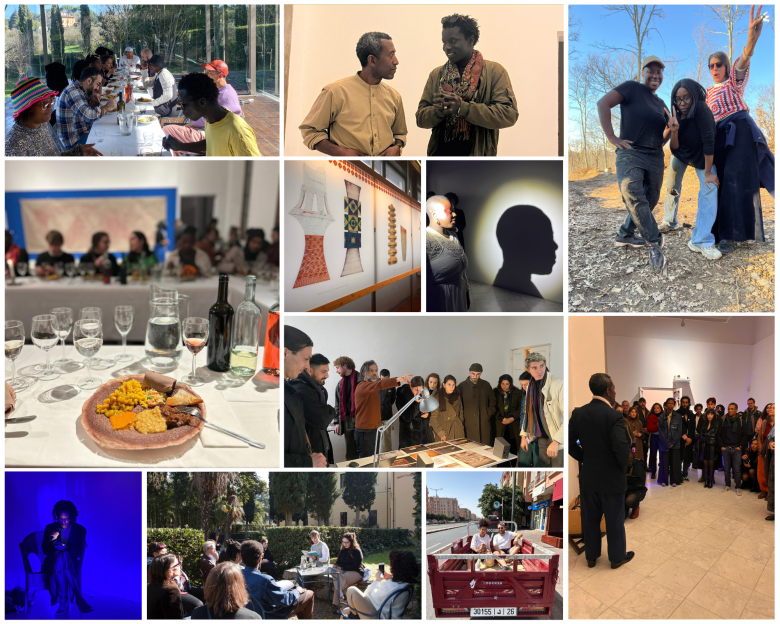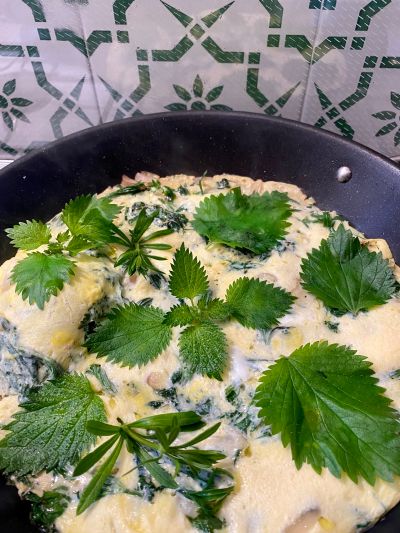"Monthly Dispatch"
Monatsbrief der VILLA ROMANA – Januar 2024

We are waking. Waking as holding space for each other. Waking as celebrating a passage.
The month of February has been a month of rebirth, with the house reopening its doors and unshutting its windows as open eyes on the city. After two months of endotic research and office work – December and January are always a time of transition between one group of artists and another one inhabiting the Villa – the programme of Villa Romana has started again, welcoming the new Villa Romana Fellows at our House For Mending, Troubling, Repairing: Rubèn D’Hers, Tuli Mekondjo, Monai de Paula Antunes, Sergio Zevallos.
It has been the beginning of new cycle. A cycle that we felt urged to start by acknowledging and recognising the need to pause and grief, the necessity to gather and wake together. We are living in tremendously complex and painful times, times in which as artists and as cultural workers, we feel the urge to mobilise in front of the atrocities that we are asked to witness - televised and normalised in our daily life. It is against the backdrop of these casualties and this climate, that Villa Romana started its 2024 programme with Notes on the Wake. Rhapsody and Lamentations in Three Acts: an urgent and moving exhibition curated by our Mistura Allison, responding to the framework of the rich programme of Black History Month Florence 2024 – this edition focusing on the theme Whole Rest, and unfolding as reflection and “a reaction to the weariness that comes with dealing with cultural insensitivities, where marginalized communities are often required to defend their existence, while their cultural products are extracted and exploited for knowledge, profit and power” as Justin Randolph Thompson¹ puts it. Notes on the Wake opened last 16 February, seeing the participation of some of the most inspiring artists we could bring together: Leo Asemota, Lerato Shadi, and Helena Uambembe. Thinking with Christina Sharpe², the exhibition proposes "wake work" as a site of artistic production, resistance, consciousness, and possibility for living in Diaspora, offering a reflection on a way forward. Together.
The day of the opening represented for us a meaningful moment, on a day in which another tragedy on a construction site here in Florence happened, and five people lost their lives. While some cultural spaces in town suspended their programme in sign of respect, we decided instead to embrace symbolically the victims of the accident and wake for them too, while obviously thinking intensely about all the victims of the atrocious conflicts being consumed in the world right now, the children, the women, the vulnerable people, all the men that are losing life in violent ways, and that could be instead protected. The performances of Naomi Kelechi Di Meo, Leo Asemota, and Helena Uambembe were utterances that helped us to articulate the inarticulable. We are thankful for their presence and their gracious sharing. We spent enriching evenings and days together (but we also had dramatic moments, getting stuck with the car in the mud, very literally! while recuperating materials for the exhibition ☺), embracing moments of reciprocity and of true inspiration.
Our cogitations and collective practices were further instilled by the people – artists, academics, and cultural workers – who contributed to the life of the Villa while participating in the project Like Swarming Maggots: As another way to open space and context for our new fellows, on Saturday 17 February, we held a day-long series of workshops and presentations brought together by artist Alessandra Ferrini, launching a publication and research project financed by the Italian Council: on the occasion of the opening of Alessandra’s show Unsettling Genealogies at the Museo del Novecento in Florence. Tewa Barnosa (guest artist in Villa Romana for a month), NiccolòAcram Cappelletto, Amalie Elfallah, and Sarri Elfaitouri presented their research and investigated archival practices between Libya and Italy. A public moment, to present the research and the dialogue behind the eponymous publication project that Alessandra Ferrini is launching soon, with the independent publishing platform Archive Books and in collaboration with Villa Romana, thanks to the generous support of the Italian Council. More soon!
Throughout the 29 days of February, there have been multiple occasions to celebrate the IX edition of Black History Month Florence and the programme woven together by The Recovery Plan and its community: We hosted a memorable dinner with the international guests that participated in the YGBI residency and the retreat project Repose as Resistance, we reactivated last year’s tradition of the Sunday Healing Lunch, and collaborated in the opening of the solo show Le Code Noir by Hamedine Kane, current Villa Medici Fellow.
We also grateful for the visit of CAMPO - the international curatorial studies programme from Fondazione Sandretto Re Rebaudengo, led by curator Bernardo Follini - for a guided tour of our show and focused studio visits with our fellows.
In the format of the dispatch, it seems just impossible to fill in the many enriching reflections and transformative moments that we could experience together in this new season in Villa Romana. We are thankful to the fellows, and to the guest artists that have passed by and for those that have been staying here, like artist and curator Tewa Barnosa and artist Helena Uambembe, who are soon departing after a month with us, to leave space to new guests, Zineb Achoubie and Lorenzo Sandoval. They have not just co-habited the house and found space for focusing on their individual practices and research, but they also came to hold space together with our Fellows 2024, supporting us in the process of making home for them, giving further context to some of their possible investigations in Italy and here in the house, while preparing the ground for the development of further projects. Artists Niccolò Moronato, Alice Jasmine Crippa, and Prince Ebo Asford did the same, spending a couple of days in the Villa in preparation of the soon to come Trattoria Guaiana, a multisensorial experience and project inspired by the story of the abandoned Medici colonial project in the region now known as French Guyana in 1608. With them, we established collaborations with various independent local artistic initiatives, laboratories, and companies, among which Lottozero in Prato, Fondazione Bisonte in Florence, and Fondazione Bitossi in Montelupo Fiorentino. We can’t wait to share more with you soon, and to book you a slot for one of the upcoming dinners at the Trattoria!
-----
¹ Justin R. Thompson, “Black History Month Florence 2024”, in The Florentine, 29 Jan 2024: https://www.theflorentine.net/2024/01/29/black-history-month-florence-3/
² Christina Sharpe, In the Wake: On Blackness and Being, 2016, Duke University Press.
|
(After)Word The wake captures the paradox of movement and immobility, reflecting on the suspended state of longing, memory, and anticipation that defines the Diasporic condition. SAVE THE DATE!
PERIOD!
|
Evergreen Recipes
Omelette of Urtica dioica (common nettle) and Galium aparine
Here are the most common wild plants in the garden at this time: Urtica dioica and gallium aparine. Their healing properties are already mentioned in the writings of Pliny the Elder and they are excellent in the kitchen, for example to prepare a tasty and nutritious omelette! Ingredients: 300g Nettles 15-20 florets of Galium aparine 3 Shallots 5 Eggs 40g Parmesan cheese to grate Salt Pepper Extra virgin olive oil Preparation: To prepare the nettles, wear latex gloves. Peel the nettle, removing the stems and keeping only the leaves. Soak the nettle leaves and galium florets in cold water, wash thoroughly and drain well. Blanch the nettle leaves for a few minutes, then sauté them together with the galium florets in the sautéed shallots for 5 minutes. Break the eggs in a bowl with a bit of water, then season with salt and pepper. Add the grated Parmesan cheese and whisk together. Pour the eggs over the vegetables and mix everything together, making sure that the eggs cover the entire bottom of the pan. Cover with a lid and leave to simmer for about 8 minutes, then turn the omelette over with the help of the lid and leave the other side to cook for another 4 minutes uncovered. When the mixture has a thicker consistency and a darker colour, plate your nettle and galium omelette and serve it warm or cold. Enjoy! PEPITE - Sonic Nuggets
from the Radio Papesse's Archive A walk through my Cũcũ’s farm by amazing composer Nyokabi Kariũki, a short sound piece in Kiswahili and Kikuyu - presented at Lucia Festival 2021 - that walks us through Githũnguri, Kenya, in Nyokabi's grandparents' farm, where she found herself paying more attention to the ground, to the flowers, fruits, leaves, birds, cows, to the languages she speaks with her grandmother. It felt like the spaces between each avocado tree, the stillness between each conversation, the sounds of nature were silently teaching her to revel in these little moments with family. Here you can listen to it with subtitles: https://www.luciafestival.org/it/lavoro/a-walk-through-my-cucus-farm/ |
|
|
|
|
|
|
|
|
|








